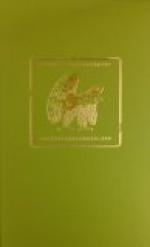Daniels smiled his ingenuous smile. “It’s just to celebrate a little streak of luck,” he said. “And I owe it to you. If you hadn’t been at Vivian Court to write up the decorations for that bridge-luncheon and happened to make that snap-shot of the Morganstein party, my leading lady would have gone to the paper as Miss Armitage straight, and I guess that would have queered me with the chief. But that headline you introduced about Mrs. Weatherbee’s incognito struck him right. ‘Well, Jimmie,’ he said, ‘you’ve saved your scalp this time.’”
The Society Editor smiled. “You were a gullible kiddie,” she replied. “But it’s a mystery to me how you could have lived in Seattle three years without knowing the prettiest woman on the boulevard by sight.”
Jimmie shook his head. “I haven’t the shadow of an excuse, unless it was because another girl was running such a close second she always cut off my view.”
“Think,” said Miss Atkins quickly, disregarding the excuse, “if that name, Miss Armitage, had been tagged to a picture that half the town would have recognized. Mrs. Weatherbee is the most popular lady, socially, in Seattle. When there’s a reception for a new Council, she’s always in the receiving line; she pours tea at the tennis tournament, and it was she who led the cotillion at the Charity ball. You would find her name in all the important affairs, if you read the society column.”
Daniels nodded meekly. “It was a hairbreadth escape, and I’m mighty grateful.”
There was a little silence then, but after the waiter had filled the long-stemmed glasses and hurried away, she said slowly, her gray-blue eyes sifting Jimmie through and through: “It looks like you’ve been playing cards for money, but I never should have suspected it—of you.”
Daniels shook his head gravely. “No get-rich-quick games for me. My luck doesn’t come that way. But it cost me nearly two thousand dollars to find it out. I’ve always meant to tell you about that, sometime. That two thousand dollars was all my capital when I came to Seattle to take my course in journalism. I expected it to see me through. But, well, it was my first week at the University—fortunately I had paid the expenses of the first semester in advance—when one night a couple of fellows I knew brought me down to see the town. I didn’t know much about a city then; I had grown up over in the sage-brush country, and I never had heard of a highball. To start with I had two, then I got interested in a game of roulette, and the last I remember I was learning to play poker. But I must have had more high-balls; the boys said afterwards they left me early in the evening with a new acquaintance; they couldn’t get me to go home. I never knew how I got back to the dorm, and the next day, when I woke, the stubs of my checkbook showed I had signed practically all of my two thousand away.”
There was a brief silence. Out in the main room the orchestra began to play. Miss Atkins was looking at Jimmie, and her scarlet lips were closed like a straight cord.




